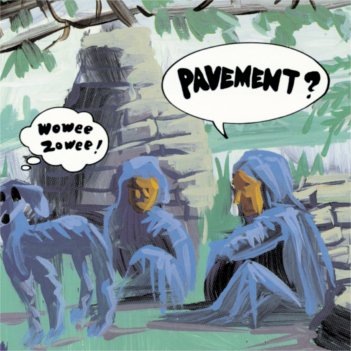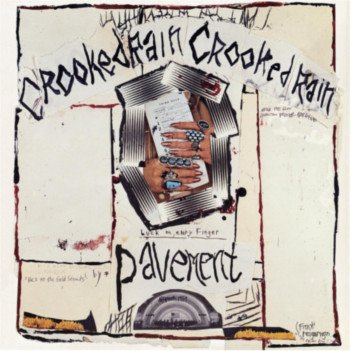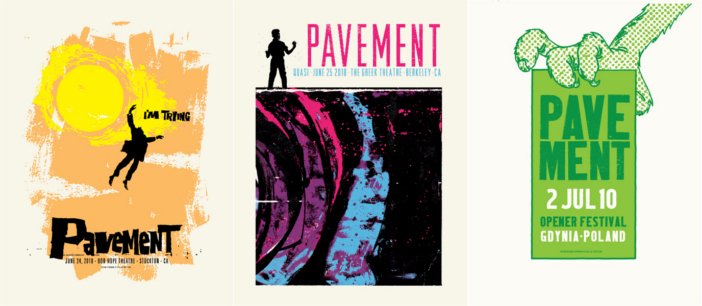Retrograde: Holy Cowee: 20 years of Wowee Zowee

1995 was probably not the best of years for Steven Malkmus After the critical lauding of the previous year’s Crooked Rain, Crooked Rain and the minimal mainstream presence that the album afforded to the band, the pavement frontman was, by his own admission, smoking a copious amount of marijuana to deal with his newfound, albeit limited, commercial success. This, however, is still Pavement we’re talking about and their anti-music scene hit and album cut ‘Cut your hair’, which only barely made into the top ten of US modern rock charts in 1994, was as close as they were ever going to get to having their own ‘Smells like Teen Spirit’ moment. Nevertheless, for the likes of Malkmus it would appear this was enough attention to reassess the band’s path.
It was also the year in which Pavement released their third and most ‘out there’ album Wowee Zowee and the initial reaction was at best, mixed. Everything about the album seemed to be a deliberate departure and response to more ‘classic’ rock found on the preceding work: the sound was sprawling and eclectic, the instrumentation more varied, and the tracks, with their spontaneous sonic shifts and left turns, came off as disjointed and inaccessible. It was like a more experimental version of their clattered, masterful debut Slanted and Enchanted. This was stoner rock but without the distortion.[pullquote] Even the comic book-esque, cryptic cover art of the two anthropomorphic figures in conversation with some sort of animal is comically indecipherable (To this day I still wonder if that thing is a goat or a dog). [/pullquote] In short, for an indie rock LP, it was weird, very weird. Even the comic book-esque, cryptic cover art of the two anthropomorphic figures in conversation with some sort of animal is comically indecipherable (To this day I still wonder if that thing is a goat or a dog).
The critical reception was of the kind the band was not likely familiar with; a lukewarm one. Up to that point they’d had always been the critic’s darlings, the little underground band that never got the mainstream recognition given to their older siblings Nirvana or Pearl Jam. Now however, they had overplayed their hand. The reviews weren’t really scathing but more like ones written by a parent who’d become disappointed with their overachieving child. In their review for the album, Rolling Stone infamously claimed that the band had become one who was now “afraid of their own success” (Kings of revisionism, the magazine later gave Wowee Zowee a glowing retrospective review). The argument, however, that it was just a reactionary album was both unfair and considering that some songs had already been recorded in the Crooked Rain sessions, had no basis to it.

As for the fans, it was a bit of a marmite situation, some had found it too frustrating to really get a hold of with while others who loved it saw it as the culmination of what Pavement had always been gearing up to.
Malkmus’ own pre-emptive response in the press kit to what he must have felt would be the inevitable reaction would only make Wowee Zowee come off as even more esoteric and elusive: “Do you like progress? Not me. Progress is predictable and predictability involves science. I want nothing to do with science. Life is not a chemistry test”. Again, the guy was smoking a lot of weed. Nonetheless this was still a clear statement of intent that suggested that Pavement would never be the band that would stay in one place too long and would always be one that favoured artistry over their careers. The acrimony between the band the critics would last a couple years until Pavement made all things good again when they reverted back to a more radio-friendly sound in the very solid but somewhat safer Brighten the Corners.
Wowee Zowee’s lacklustre release must have been made all the more stinging by the release of another classic alt rock record, Mellon Collie and the Infinite Sadness, in the same year. The band’s arch-rivals The Smashing Pumpkins came out with a seminal LP that debuted at No 1, ended up on many end of the year ‘best of’ lists, and went on to sell close to a bazillion copies. For the uninitiated, Malkmus started the feud – on Crooked rain track ‘Range life’, no less, when he half-heartedly called the Pumpkins a “bunch of nature kids” that “don’t have no function”. Billy Corgan, who had Pavement kicked off that years Coachella roster as he refused to play in the same festival, clearly didn’t see the funnier side. All that ancient history aside, it’s the pavement record that I think has actually aged the better. Melon Collie was and is a great album, but it was essentially of its time. Wowee Zowee’s sonic experimentation and sense of a band just playing with the reigns off ensured that it existed almost outside of time. It’s ironically that which made the album such a tough nut to crack on release is also what made it so endurable.

So what has happened over the last two decades that has resulted in the album now being hailed as a near masterpiece? One could argue that it’s fractured and disordered nature has made it all the more resonating in the madness of the post 9/11 world (I wouldn’t). Much more likely is that those diehard fans who grew up with and loved Wowee Zowee are now the same snooty tastemakers who write for the likes of Spin and Pitchfork. There’s also the nature of the songs themselves. These weren’t immediately approachable like the more summery tracks of Crooked Rain but rather they were slow-burners, ones that demanded your patience and if you gave them that, they would be just as rewarding.
Give up on Wowee Zowee early on at your peril as you could end up missing some of the most chaotically enjoyable songs of Pavement’s back catalogue. The beautifully distorted and pedal heavy ‘Kennel District’- conceived by guitarist Scott Kannenberg (A.K.A. Spiral Stairs) – is arguably the best song in the bands career that was not written or sung by Malkmus. The chiming guitar that opens another of their best ‘Grounded’ is as pretty sounding as Pavement got, but it also brilliantly contrasts the heavier guitar string bend that acted as a chorus which was so good it didn’t need vocals. [pullquote] The lyrics here at their most well… Malkmus-esque, to the extent where you’re never really quite sure if lines like “Getting off on the candelabra/ we call her Barbara, breeding like larva” are truly terrible or works of pure genius. [/pullquote] If there was one song on the album that summed it up as a whole, it would be the bizarrely bipolar ‘Fight This Generation’: A track which starts out with Malkmus, accompanied only by a serene cello, crooning softly until it suddenly diverges into much stranger territory as all hell breaks loose with eerie strumming, fuzzy electronics and Malkmus repeating the songs title over and over and with vitriol.
Whether this is their greatest album may be questionable, but what’s maybe more certain is that it’s probably the bands most idiosyncratic. The lyrics here at their most well… Malkmus-esque, to the extent where you’re never really quite sure if lines like “Getting off on the candelabra/ we call her Barbara, breeding like larva” are truly terrible or works of pure genius. Enjoyment of the man’s lyrics has always been more about the linguistic acrobatics he displays rather than anything else and his mantra for the words he picks seem to be more about how they sound then what they really mean. His vocal mannerisms are also at their most pronounced here he mumbles shouts and use spoken word even more than usual somehow, perhaps due to the eclectic style.

This isn’t to say that the album’s lyrics aren’t capable of being poetic or offering insight. The frenetic and enjoyably buoyant ‘AT&T’ – which is the closest thing the LP has to a pop song and it’s a wonder why is wasn’t released as a single, is actually a comment on what technology and commercialisation has done to human interaction in the modern world. The singer’s final, spine tingling wail comes off as a longing for connection in a world where it’s increasingly hard to come by (just don’t ask why he thinks hearts can be made of gravy, that’s just faulty biology).There is also a greater mash of styles here than before. On the more subdued and sweet ‘Father to a Sister of Thought’, the band at first go full alt-country in something that sounds like it belongs on the Brokeback Mountain soundtrack and then at the closing stage they out of nowhere switch to harder blues style riffs. It just works.
Admittedly, not everything on Wowee Zowee works as well as the aforementioned. There are one or two weaker tracks, most notably the lengthy “Half a Canyon” which feels like a lesser version of the six-minute jam session and Crooked Rain closer ‘Filmore Jive’ but these are minor casualties that are perhaps expected in an album that reaches like this one. At 18 songs and 56 minutes, a mammoth record in Pavement terms, this is more about quantity over quality and the majority work and work very well.
For most critics and fans alike, the positions for the band’s finest two records have been reserved for those first two but assigning that third position has always been a little more contentious. Wowee Zowee will always hold that mantle because it was the last time the band really went all out. Even if they were just a group of old friends smoking weed, jamming freely and embracing studio trickery for the fun of it, there was method in the madness. In terms of the their legacy, it might actually be their most important record in that cemented their status as a band that will always keep their feet firmly rooted in the underground. If a catchy hit like ‘Cut your Hair’ showed that Pavement knew how to play the game and win it then an album like Wowee Zowee was them choosing not to play that game and winning away.
Featured Image via Pitchfork.com

